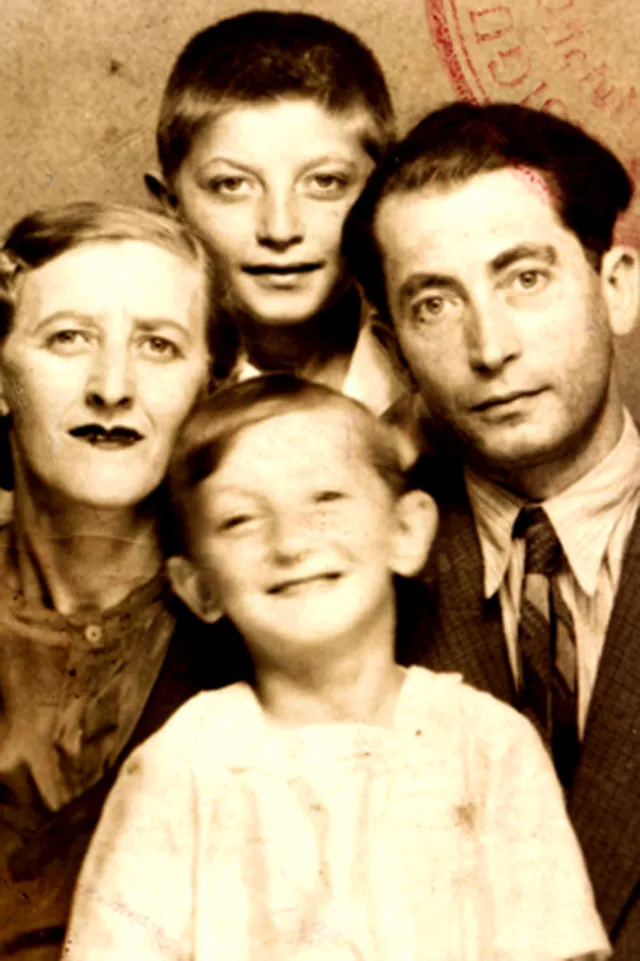The Goldstein family
This is the first family photo, taken before my brother and I left to Moldavia on vacation. It was in 1934. Behind my parents there is my brother, Marcel Golstein and in the second row are my parents, Surica and Lazar Goldstein. I am the one in the front. I was 5 and my brother was 10. Two years later, he would begin his apprenticeship as a clocksmith. In that time, I used to go to Miss Jenny's kindergarten.
My parents first got engaged, on 3rd June 1922. A few months later, they became husband and wife. They had a Jewish wedding, before the rabbi, under the kippah, but they also went to the civil authorities. My parents only had two children: my brother, Marcel Goldstein, born in 1924, and myself, the younger one. I remember Marcel as a handsome and elegant boy.
I was born in Bucharest, on 7th October 1929. My name, Ticu, comes from Tipora [bird in Hebrew], which was the name of an aunt of mine who raised my mother. My parents were expecting a girl and had thought of that name. I spent my early childhood in a reasonable place, on Logofat Tautu St. But soon my parents had to move, and so we ended up on Negru Voda St., in two shabby rooms. [Ed. note: Negru Voda St. was located within the Vacaresti-Dudesti area, which was then a peripheral, destitute zone of Bucharest, with the highest concentration of Jews. The city never had a ghetto in the strict sense of the word. Jews could settle anywhere they could afford to buy a dwelling.]
I was sent to a private kindergarten when I was about 4. The mistress was Miss Jenny, a kind, tender woman. Unfortunately, the fee was too big for my family's budget, so I stopped going there after a while. From my kindergarten days, I keep the memory of my first automobile ride - which was, of course, a luxury in those days. We had to go to the Savoy Theater, where my kindergarten had a festivity; the ones who had to perform on stage were taken there by car. I only had one line to utter: 'My pity for you makes my heart break'. But the stage fright made me say it wrong: 'My heart for you makes my pity break'. Everyone laughed, although that was supposed to be a tragic moment. Thus, my actor's career began and ended with the same line.
I went to elementary school at the Jewish School on Colonel Orero St. There were only Jews there, so I was protected to a certain extent. Charity was a rather common practice back then - I would eat at school and I would sometimes get clothes and footwear from there. But there were times when I was unable to get to school for no reason other than the fact that I didn't have any boots or shoes to out on. I was sorry because we didn't have Romanian classmates, and because it wasn't a mixed school - this way, I could've met some girls too. I used to get good grades and I was awarded prizes at the end of the year several times. I loved the Romanian language and I acquired a passion for reading: I would read a book every two days. Back in those days, physical punishment was still present in schools; it was still believed that 'all beating comes from heaven' [Romanian proverb]. A crowbar always leaned against the teacher's desk, but it only served as a means of intimidation, for no one ever used it. What they did use was an extremely stiff linden ruler. After a beating session (the 'felon' would get 40 hits on each palm), the palm would swell three times. One would be punished for truancy, for not doing one's homework and for not having learnt one's lesson. The calligraphy teacher, who was a bit insane and had fits of hysteria, used other methods: she would have the pupil lying on the floor and would trample him; or she would pull the pupil's whiskers until plucking them off.
After finishing the elementary school, I wanted to go to the [Romanian] Regele Ferdinand Secondary School. I passed the exam, got admitted, and? that was it. It was the summer of 1940 and the law banning the Jewish children from the Romanian schools was passed [according to the Jewish Status]. So I had to go to a Jewish school again, the Malbim Complementary School, which was virtually useless, as it didn't count as a secondary school. Until the end of the war, I also attended the Cultura Theoretical High School, which was Jewish too. I received a scholarship, because I was a good student and my parents didn't have the means to pay for the tuition.














